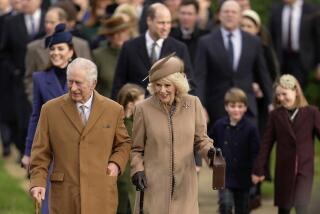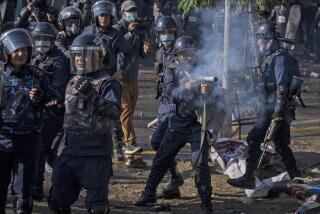With a Royal Push, Democracy Falls Off the Roof of the World
- Share via
Just 10 days after President Bush boldly proclaimed Washington’s “ultimate goal of ending tyranny in our world,” he was presented with a fascinating test case -- not in Iraq but in the Himalayan kingdom of Nepal.
This week, Nepal’s King Gyanendra sacked the democratically elected Prime Minister Sher Bahadur Deuba, placed senior politicians under house arrest, declared a national state of emergency, closed the international airport and cut off phone services and media Internet sites while deploying troops in the streets of the capital. The king rather brazenly justified his action as necessary to “protect democracy,” but he acknowledged that it would be at least three years before he considered a return to civilian rule.
Sadly, the king’s move is likely to cast Nepal further down the vortex of its already deadly civil war. Since 1996, Nepal has battled a frustrating and lethal insurgency by Maoist rebels that has claimed more than 10,000 lives, most of them civilians.
Across much of Nepal, neither the government nor the Maoists are fully in control, and basic services such as health and education have largely collapsed. The Maoist movement gained much of its early momentum from widespread anger in western Nepal over government human rights abuses and the government’s inability to improve living standards in the countryside or to deal with the nation’s deep social and class divisions.
What makes the king’s latest move puzzling is that it is a direct repeat of steps he took in 2002, when he dismissed the same prime minister, citing his ineffectiveness in combating the Maoists. Under considerable pressure, the king had reinstated Deuba in 2004. The earlier suspension of democracy quickly turned Nepal’s crisis into a triangular conflict, pitting the Maoists, the palace and the political parties against one another. Given that the political parties have no armed forces, they could eventually make common cause with the Maoists if the palace continues to isolate elected officials in this crisis.
As Nepal’s conflict nears its 10-year anniversary, several truths appear to be increasingly self-evident.
First, there is no easy military solution. Despite considerable military assistance to the government from the United States, India and Britain, the insurgency shows no signs of abating. Katmandu has been the site of increasingly serious attacks by the Maoists, and the capital was blockaded during 2004. The Maoists are well organized, and Nepal’s terrain makes it hard to stamp out a guerrilla movement.
Second, the political parties and the king need to work together to present a unified front to the Maoists by vowing that the country will not succumb to guerrilla attacks or Maoist appeals for a single-party state.
Third, there needs to be a clear understanding by all sides that a negotiated solution is the only solution. It would require all sides to be at the table and an understanding that representative democracy, improved human rights and a constitutional overhaul are essential.
The king’s fiat also underscores the dangers of President Bush’s often Janus-faced approach to promoting democracy. Although fond of offering bold speeches in defense of freedom and liberty, the president has had a less than stellar track record in defending democracy. For example, King Gyanendra and his advisors frequently cite Pakistan as a model -- a nation where the military government of Gen. Pervez Musharraf continues to shun democracy with full backing from Washington.
Though the State Department was quick to argue that the king was “undercutting Nepal’s democratic institutions,” there was no indication that U.S. policy, including military assistance to the king’s government, was about to change. Further, the king and his advisors probably remember that the Bush administration substantially increased donor assistance the last time he suspended democracy.
Both the king and the Bush administration would do well to understand that democracy cannot be conveniently dismissed when they view such action as being in their self-interest.
More to Read
Sign up for Essential California
The most important California stories and recommendations in your inbox every morning.
You may occasionally receive promotional content from the Los Angeles Times.










